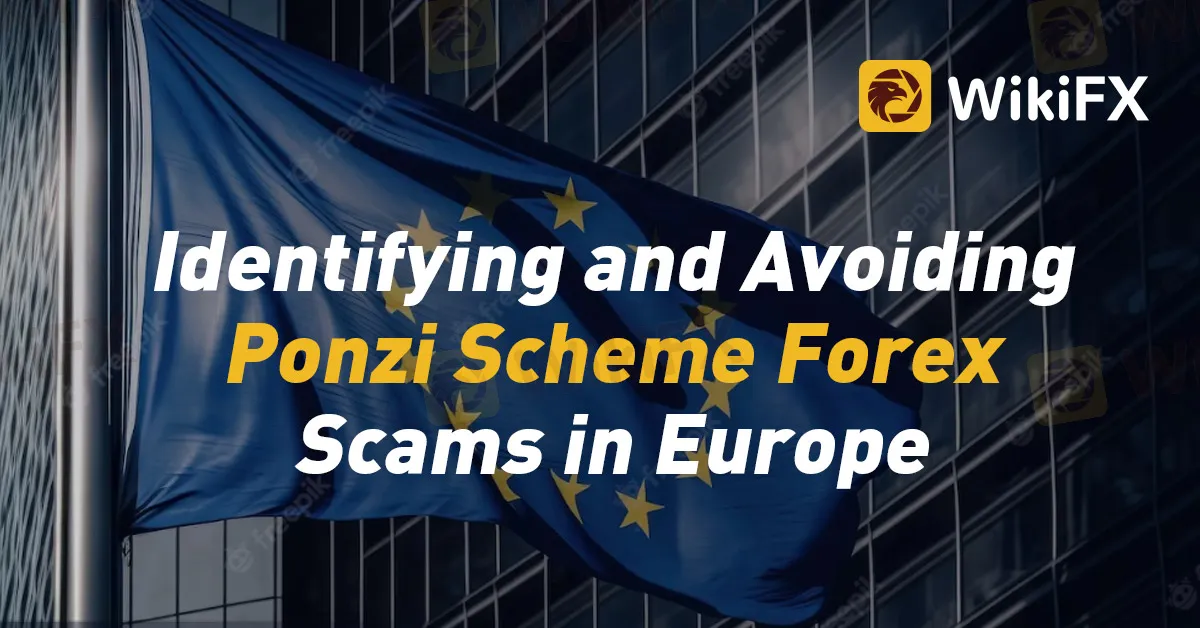简体中文
繁體中文
English
Pусский
日本語
ภาษาไทย
Tiếng Việt
Bahasa Indonesia
Español
हिन्दी
Filippiiniläinen
Français
Deutsch
Português
Türkçe
한국어
العربية
Identifying and Avoiding Ponzi Scheme Forex Scams in Europe
Abstract:Ponzi schemes have been a persistent problem in the financial industry, and forex markets are not exempt from their reach. These scams promise unrealistically high returns, often through forex trading, but instead rely on new investors' funds to pay off older investors. In this article, we will discuss how to identify and avoid Ponzi scheme forex scams in Europe.

Ponzi schemes have been a persistent problem in the financial industry, and forex markets are not exempt from their reach. These scams promise unrealistically high returns, often through forex trading, but instead rely on new investors' funds to pay off older investors. In this article, we will discuss how to identify and avoid Ponzi scheme forex scams in Europe.
Unrealistic Promises
Ponzi schemes lure victims with promises of extraordinary returns on investments. Be cautious of any scheme that guarantees high, consistent profits with little to no risk. Remember, if it sounds too good to be true, it probably is.
Lack of Transparency
Ponzi schemes often lack transparency when it comes to sharing information about their trading strategies or the specifics of their investments. Legitimate forex trading firms provide transparent information about their strategies and investments, while Ponzi schemes rely on secrecy and vague explanations.
Pressure to Recruit
Ponzi schemes typically encourage participants to recruit others to join the scheme. This is done to sustain the flow of new investments, as the funds from new recruits are used to pay off older investors. If a scheme emphasizes recruitment over actual trading, it's likely a Ponzi scheme.
Verified Track Record
Legitimate forex firms can provide verifiable records of their trading history, demonstrating consistent returns over time. In contrast, Ponzi schemes often fail to provide audited records or any evidence of their trading activities. Request proof of trading performance before investing.
Conclusion
Protecting yourself from Ponzi scheme forex scams in Europe requires vigilance and skepticism. Avoid schemes that promise unrealistic returns, lack transparency, or emphasize recruitment over trading. If you suspect a scheme may be a Ponzi scheme, report it to the appropriate authorities immediately. For more information on forex scams and reliable resources, visit WikiFX at www.wikifx.com. They offer valuable insights and tools to help traders make informed decisions and avoid falling victim to fraudulent schemes.

Disclaimer:
The views in this article only represent the author's personal views, and do not constitute investment advice on this platform. This platform does not guarantee the accuracy, completeness and timeliness of the information in the article, and will not be liable for any loss caused by the use of or reliance on the information in the article.
Read more

M2FXMarkets Review 2024: Read Before You Trade
Avoid M2FXMarkets! Unregulated, dubious trading plans with daily returns of up to 25%. A low 1.25 WikiFX rating highlights serious concerns. Read why its risky.

Social Media Investment Scam Wipes Out RM450k Savings
A former finance officer in Malaysia lost RM450,000 in savings after being deceived by an investment scheme advertised on social media.

Malaysian Woman's RM80,000 Investment Dream Turns into a Nightmare
A 50-year-old Malaysian woman experienced a devastating loss exceeding RM80,000 after falling victim to an online investment scam that preyed on her aspirations for substantial returns. The victim, a former secretary at a private firm, had initially hoped to secure a profitable investment opportunity but instead found herself deceived by a fraudulent scheme.

JP Morgan Affiliates Agree to Pay $151 Million in SEC Settlements
JP Morgan faces regulatory penalties and investor reparations due to SEC findings of misleading disclosures, fiduciary breaches, and conflicts of interest.
WikiFX Broker
Latest News
M2FXMarkets Review 2024: Read Before You Trade
One article to understand the policy differences between Trump and Harris
US Presidential Election in Overdrive: Exploring Forex Wealth Codes with WikiFX App
How U.S. Elections Have Influenced Financial Market Trends Since 2000
Zenstox: A Trader’s Nightmare? An Inside Look at Alleged Scams and Unethical Practices
eToro sponsors the Bitcoin Mena Conference
Bitcoin.com Introduces Venmo for U.S. Bitcoin Purchases via MoonPay
What Happened to NFTs?
FunderPro Integrates cTrader for Enhanced Prop Trading Options
What Should Forex Traders Expect from U.S. Election Volatility?
Currency Calculator



